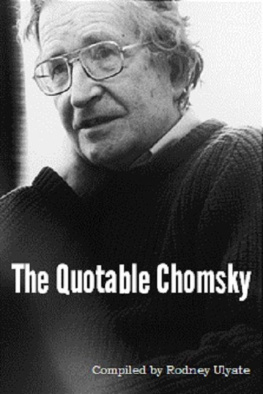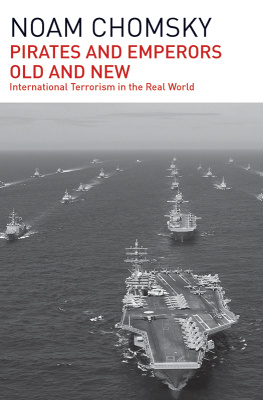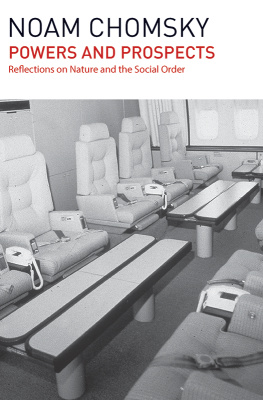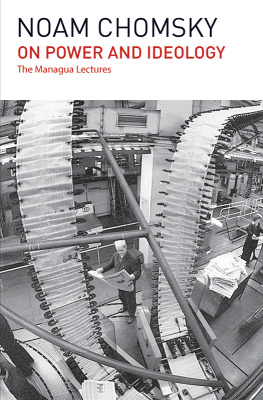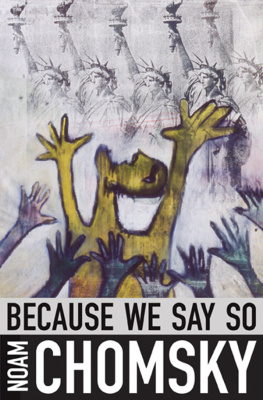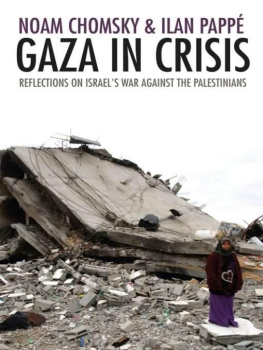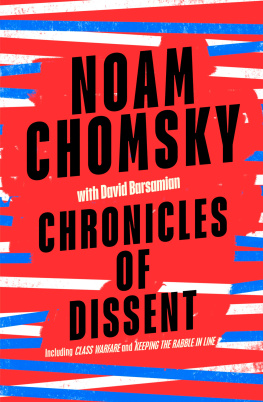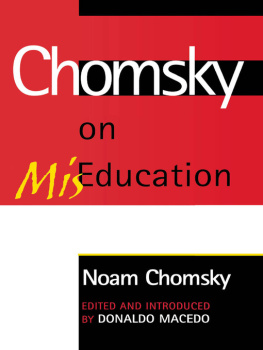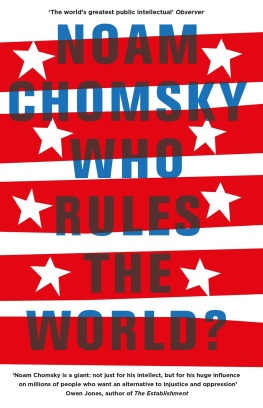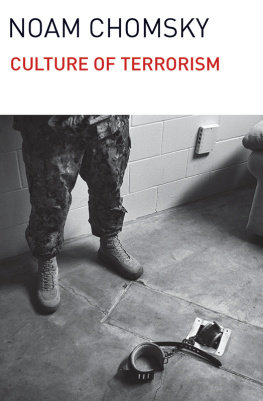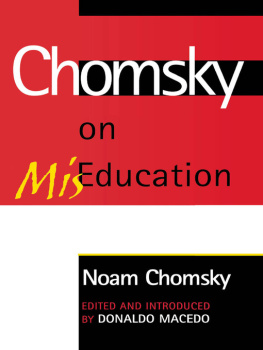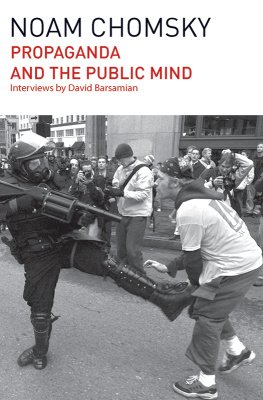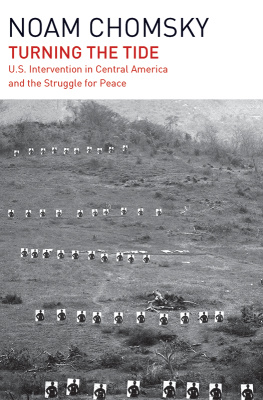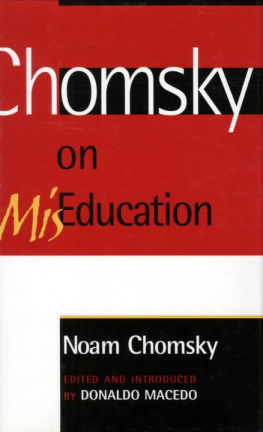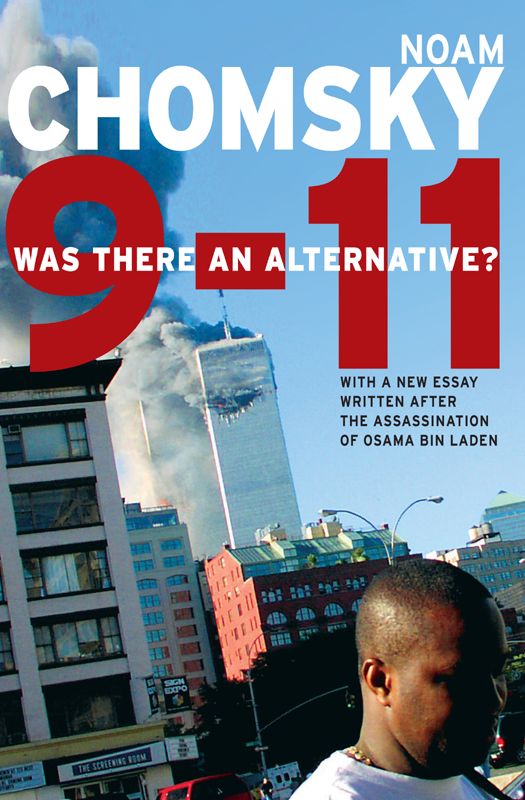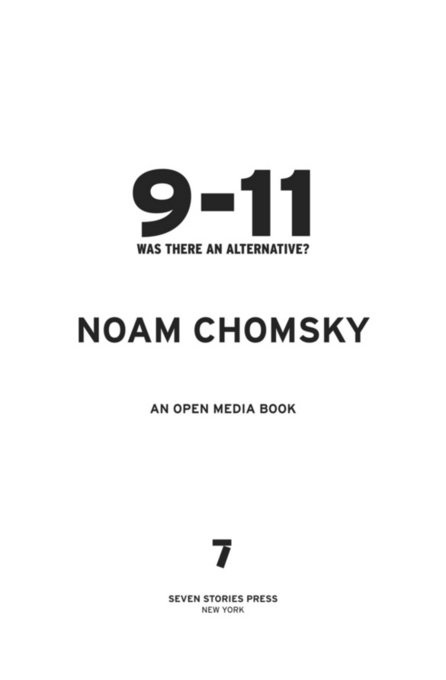Copyright 2001, 2002, 2011 by Noam Chomsky
Was There an Alternative? 2011 by Noam Chomsky
Reflections on 9-11 2002 by Noam Chomsky. First published by Aftonbladet in Sweden, August 2002, and in 11 Septemberett r eftert (September 11One Year After) (Stockholm: Aftonbladet, 2002).
The Open Media Series is edited by Greg Ruggiero and archived by the Tamiment Collection at New York University.
Front cover photo by Greg Ruggiero: September 11, 2001, view from Canal Street and Hudson.
White House photograph by Pete Souza: President Barack Obama and Vice President Joe Biden, along with members of the national security team, monitor the mission against Osama bin Laden in the Situation Room of the White House, May 1, 2001. Seated, from left, are: Brigadier General Marshall B. Brad Webb, Assistant Commanding General, Joint Special Operations Command; Deputy National Security Advisor Denis McDonough; Secretary of State Hillary Rodham Clinton; and Secretary of Defense Robert Gates. Standing, from left, are: Admiral Mike Mullen, Chairman of the Joint Chiefs of Staff; National Security Advisor Tom Donilon; Chief of Staff Bill Daley; Tony Binken, National Security Advisor to the Vice President; Audrey Tomason Director for Counterterrorism; John Brennan, Assistant to the President for Homeland Security and Counterterrorism; and Director of National Intelligence James Clapper. Please note: a classified document seen in this photograph has been obscured.
All rights reserved. No part of this book may be reproduced, stored in a retrieval system, or transmitted in any form, by any means, including mechanical, electric, photocopying, recording or otherwise, without the prior written permission of the publisher.
Library of Congress Cataloging-in-Publication Data
Chomsky, Noam.
9-11 : updated and expanded after the assassination of Osama Bin Laden, with a new introduction, Was there an alternative? / Noam Chomsky
p. cm. (An open media book)
eISBN: 978-1-60980-154-0
1. September 11 Terrorist Attacks, 2001. 2. TerrorismPrevention. I. Title. II.
Title: Nine-eleven.
HV 6432.7. C 48 2011
973.93--dc23
2011027901
v3.1
I would like to thank David Peterson and Shifra Stern for invaluable assistance with current media research particularly.
NOAM CHOMSKY
Contents
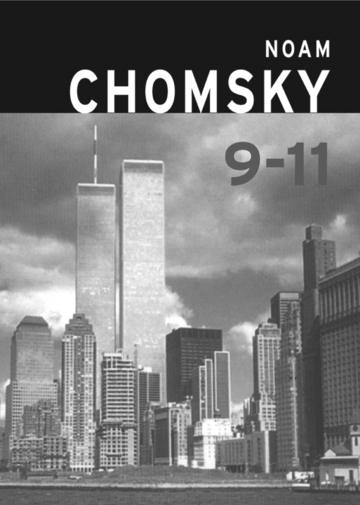
Cover of first edition of 9-11.
EDITORS NOTE
T he book you are holding was conceived, produced, and published as an act of protest. From the weeks immediately following the attacks in Washington and New York in 2001, to those immediately following the U.S. assassination of Osama bin Laden in Pakistan in 2011, Noam Chomsky has highlighted the lessons of history and advocated adhering to the basic tenets of human rights as the best ways to break step from the drum beats for war. In opposing violence as a political solution, Chomskys analysis of policy and media coverage in the United States poses difficult questions. Should the U.S. obey the International Court? Should the U.S. obey UN resolutions? Should the U.S. abide by the same principles and rules to which it holds other countries? What have the U.S. wars since 9/11 accomplished? The facts are harsh: Thousands of U.S. soldiers have been killed on foreign soil. Untold numbers of people in Afghanistan, Pakistan, and Iraq have been killed, injured, displaced, or detained. What are the consequences? Is the world a better place? Was there an alternative?
Was there an alternative? This is now one of the great moral and political questions of our time, and it is the title of Chomskys new essay written to introduce this third edition 9-11. Written in June 2011, Chomskys text examines the impact and consequences of U.S. foreign policy up to the assassination of Osama bin Laden in Abbottabad, Pakistan, and reflects on what may have resulted if the crimes against humanity committed on 9/11 had been approached as a crime, with an international operation to apprehend the likely suspects.
In exploring possible answers, Chomsky reviews another notorious September 11 and major historical events, many of which are simply overlooked and forgotten in the United States. In discussing the operation against bin Laden, he also touches on the imperial mentality and the decision to name the mission Operation Geronimo. The casual choice of the name, writes Chomsky, is reminiscent of the ease with which we name our murder weapons after victims of our crimes: Apache, Blackhawk, Tomahawk. We might react differently if the Luftwaffe were to call its fighter planes Jew and Gypsy.
For many who read Chomsky for the first time, his analysis can be disorienting because he focuses precisely on those facts that have been systemically under-reported or completely ignored by mainstream media. Consequences of U.S. actions in Nicaragua, for example, are not widely known or remembered in the United States. As Chomsky said in an e-mail while we were working on the book, These facts have been completely removed from history. One has to practically scream them from the rooftops.
Ten years after its original publication, the overlooked facts and difficult questions Chomsky poses in 9-11 continue to be heard over the rooftops of official history. Despite wars, despite indefinite detentions, despite drones and increasing militarization, people in this country and around the world have shown their resistance not just in the streets, but also by what we read.
A Surprise Best Sellerto quote the title of an article about it in the New York Times
Published years before Facebook and Twitter were invented, people found out about the book largely through community bookstores, word of mouth, newspapers, public radio, and even CNN, where Chomsky debated the book as a guest on American Morning with Paula Zahn.
Bookstores, particularly independents like St. Marks Bookshop and City Lights, became a driving force of distribution and sales. Seeking to explain the books success, wrote Michael Massing in the New York Times, booksellers cite its succinct title, striking cover (a stark black-and-white picture of the twin towers before the attacks), low price and accessible question-and-answer format. People are coming in every day, asking, What can I read that can give me some understanding of whats happening?
The primary challenge facing the people of the world is, literally, survival, writes Chomsky. If we indeed survive our governments propensity for confrontation and violence over diplomacy, it may be because we break away from the news feed long enough to heed dissident voices like Chomskys, published in pamphlets, posted online, spoken at protests, and shouted from the rooftops.
Greg Ruggiero
July 12, 2011
Union County, New Jersey
NOTES
Michael Massing, Surprise Best Seller Blames U.S., New York Times, May 2, 2002, B11.
Louis Menand, Faith, Hope, and Clarity: September 11th and the American Soul, The New Yorker, September 16, 2002.
.
Michael Massing, New York Times, 2002.
Was There an Alternative?
A s I write (mid-June 2011), we are approaching the tenth anniversary of the horrendous atrocities of September 11, 2001, which, it is commonly held, changed the world. A few weeks ago, on May 1, the presumed mastermind of the crime, Osama bin Laden, was assassinated in Pakistan by a team of elite U.S. commandos, Navy SEALs, after he was captured, unarmed and undefended, in Operation Geronimo.


